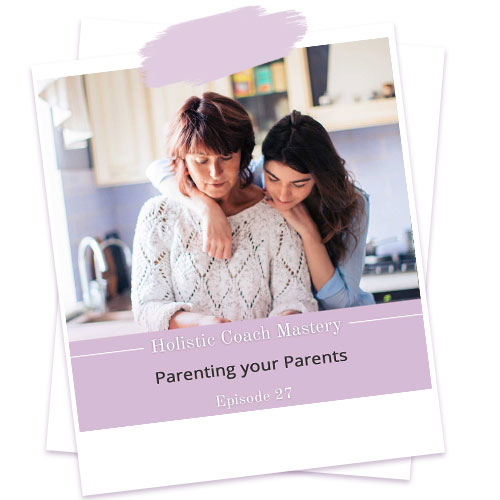
In this episode we talk about the different pathological parent-child relationships. We explore the situation when the child takes the role of the parent and the long term consequences.
Listen to the show
Subscribe:
You will learn
- How changing the parent-child roles may play a crucial role
- How this may block the possibility for the child to create their own family
- What’s the solution in such difficult situations
Resources
Hello, dear friends, and welcome back to another episode of our podcast. Today, we are going to talk about the relationship between parents and children. And specifically, the situation when the children are parenting their parents. This is a very specific situation, which may happen in different age. And what I mean by parenting your parents is the situation when the child needs to take care of their parents. And when the parents are actually acting as if they are children. This situation may happen at different age. And typically, it starts early, it may start for example, when the child is still a child, it's still, let's say 510 15 years old. And those are the cases when the parents or it could be only one of them has a concrete problem. It could be emotional instability, it could be have a separation, or some kind of health issue, especially the psychological and emotional issues. And in those cases, the parents start acting is the weak one is the one who needs care, and support and empathy. And in those cases, some children step up into the role of the parent. And for example, they are taking care of their mother who is abusing alcohol, for example, or is in depression, or has some kind of money issue or whatever, and the child becomes her emotional support. And even though this may sound as a very positive gesture from the child, as you know, the child becoming the better one taking care of the mother who they love, this can be crucially bad for this child. Because what happens is that usually, there is a very strong bond between this child and their parent. And later on, the parent don't allow the child to grow up and start their own life, start their own family and move on. They don't allow this connection to grow into the new face, which allows the child actually to move on with their life. And what happens is that the parent is in the role of the victim or the one who constantly needs support or needs help with something. And they need total attention. Typically, the core need is attention. The material manifestation may look differently. For example, it could be as we said, the health issue, or the parent who needs advice or support or whatever. The outside representation might be different, but the core reason is they need attention. They need their child to step up and become their parent, which again, it's a total change of roles. It's a night natural, it's literally not normal. And it brings problems, especially for the child. It's obvious if the parent gets into this role, they also have their problem. And I'm not saying that they are doing this with bad intentions. The truth is that in most cases, parents have the best intentions. And they may even say consciously that they want their child to grow up healthy, to have normal relationships, to move on with their life and start their own family and so on and so forth. But subconsciously, they don't allow this to happen, because they're so needy. They need Attention, they need unconditional love. So what happens is they don't let their children move on with their lives. And this is a very common scenario when the child who is already a grown up cannot have a serious relationship or can't have a family. The reason is because they get into this parental role of parenting their parents. And this doesn't allow them actually to create a family. This is not always what's happening. But this is a very common scenario. It works both for men and women. Maybe women are a little bit more affected. But of course, this may happen also with men. And you know that sometimes there are people who are in their late 30s, in their 40s, sometimes even later, and they want to have a family, they want to have a marriage or even have their own kids. And sometimes it's just not happening for them. Very often what we need to explore is their relationship with their own parents, if the parents are not letting them go, symbolically, of course, it could be a blockage. And again, from the outside, it may look completely different. It may look like a very strong, very warm, very loving connection that they have with their parents, or one of the parents. And the parent is saying, okay, I wish you all the best, I want you to have your own family. And yet, energetically, subconsciously, they don't allow the child to move on because that would mean they will abandon the parent. This works also in a later age. And I'm not talking about the cases when we know normally people get into the ending phase of their life, and they're sick, and they're about to leave this life. It's the nature ol way of life. Eventually, every life ends, we all die. That's normal. And sometimes people get sick at later age, they need help and support. And to certain extent, that's normal. But if their illness is making their loved ones hostages, don't allow them to have their own life. We may also suspect some kind of neediness or subconsciously also some kind of manipulation. And I know if you're brand new to those things, this may sound really harsh or judgmental or cruel. I'm really interested into exploring health exploring psychological reasons for illness and sickness. And there always is one behind every illness, every symptom, there is a psychological cause. And sometimes it's just the position of being needy, and eventually getting the power through it. Because you know how sometimes people who seem weak and sick, and it seems like they constantly need support from their loved ones. It's actually bringing the power into their hands. And I'm not saying those people are doing that intentionally or cautiously. Everyone has their own pain on suffering. I'm respectful of that. But the more conscious we are, the more aware we are of the possible subconscious patterns, the freer we can be. And it's very difficult if you are in the position of the child who is parenting their parents, because it's very difficult to explain to your parents, especially if they're older, and not so open to new theories, psychology, all of that. It could be a challenge, but it requires lots of work. First of all, work with yourself, to give yourself permission to set yourself free from this role. The role of the parent, you are not supposed to be a parent to your parents at any age. But especially if that starts from a younger age when literally, you are still a child or you have been a child. This is crucially bad. And it needs to be addressed psychologically, you need to work with that, especially if you struggle in your own personal life, which very often is the result of those connections. And if you are a parent, and you recognize some of those patterns in your relationship with your kids, I would congratulate you if you admit some of those patterns in your life. And if you take the conscious decision to make a change, for the better future of your kids and your own, as well. And it's a difficult situation, I know, all of those relationship with family members. They're kind of faded, there is some karma there. There are certain lessons we need to learn. That's all true. But our task is to grow, to be more self aware to understand more about what's happening and why it's happening. And I believe that we can change things, even those complicated cases, when children are parenting their parents, even they can be healed. It's not simple. It takes time, it takes work, but it's possible. And that's one of the major things we need to do. If we want to improve our own personal life, or if we are the parent, to help our child have a better personal life themselves. And again, no blame, no guilt. It doesn't mean that the parent stays at home, makes plans and says, Okay, here's how I will manipulate my child, I will be needing, I will take all of their time and attention. And eventually I will stop them from having their own life. It's not how it works. But subconsciously, because of their own trauma, their own emotional frustration, and you name it, all of the things that a human can go through. Eventually, they shape people differently. And that's just one of the possible responses to become weak, to get the power through your weakness, and to be needy of attention, especially of your kids. So very deep theme. It could be very painful, I admit that it could be very difficult in no matter which role you're in the parent or the child, it's still painful to realize that you are being manipulated, subconsciously, or subconsciously you are manipulating someone else. It hurts. It's difficult. It can raise different emotions, including anger, frustration, sadness, it's normal. But again, the more conscious we become, the more choices and freedom we have and the more we can heal ourselves, our psychology, our emotions, our families, and eventually help our children. So I hope I have opened the doors to some analysis or self realizations. And if this theme applies to you, you have some work to do, but it will be worth it. So I'm wishing you lots of strength, emotional and psychological. Don't close your eyes in front of the truth, and you can have a much better life. Thank you so much for joining me, and I will catch you next time.

